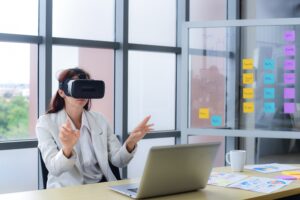Technology has revolutionized our ability to learn and acquire skills over time, significantly changing education for individuals worldwide.
From online platforms and mobile learning apps to new digital tools offering flexibility and interactivity for individual learning methods, technology continues to transform how people learn and improve their skills. This is especially concerning employees who must stay relevant and possess certain skills pertinent to the job market. For employers, having staff with strong, up-to-date skills is highly important; according to research, 77% of business leaders state that their organizations must provide their employees with relevant skills.
In general, technology is making learning accessible and personalized for individuals everywhere. Traditional methods may now need supplementing with digital ones that offer more interactivity for effective knowledge acquisition. Understanding these changes in today’s digital era is very important if individuals wish to remain competitive within their workplace environment. Read on to find out more.
An Explosive Rise in Learning Management Systems
One area in which technology has had an extraordinary effect on education is through learning management systems (LMS). These platforms act as centralized hubs for delivering educational content and tracking activities more efficiently for educators. Such platforms have revolutionized students’ engagement with course materials while communicating directly with instructors. On a global scale, these learning management systems are indispensable tools used by educational institutions, corporations and independent learners looking to advance their skill sets.
Learning management systems have quickly gained widespread adoption across institutions and businesses in the UK, for example, as learning professionals rely on them for training and development opportunities. The learning management system UK-based companies favor offers tailored solutions specifically for particular industries, ranging from education to professional development. In essence, LMS tools ensure learning remains accessible, efficient, and compliant with the latest industry standards. Having such essential tools facilitates the continuous training needs of organizations attempting to keep pace with rapid technological changes.
Personalized Learning and Adaptive Technologies
Personalized learning enabled by adaptive technologies represents another transformative development in education. Where traditional approaches often fall short in meeting learners’ individualized needs, adaptive technologies now enable educational content to be tailored specifically to each learner based on strengths, weaknesses and pace of learning. This level of personalization ensures that learners interact with material specifically tailored to them, leading to better outcomes for each individual.
These adaptive learning systems use algorithms to constantly assess a learner’s progress, adapting content to focus on areas in which they most require help, and providing individuals with personalized and effective methods for developing their abilities. Such technologies have gained popularity across a variety of platforms, including corporate training programs and educational apps, offering individuals the opportunity to enhance their skills more quickly.
Mobile Learning and Accessibility Solutions
Mobile technology has also revolutionized learning methods. Mobile learning, or m-Learning, allows individuals to access educational material anytime and anywhere through mobile phones. This opportunity makes m-Learning perfect for commuters or traveling professionals seeking quick educational content during their downtime or other off periods.
Mobile learning apps have experienced exponential growth over recent years, offering courses on everything, from languages to coding. Their accessibility makes learning much simpler for those with busy lifestyles or remote employees seeking knowledge improvement or developing their skills. Thanks to smartphones and tablets being widely available, mobile learning platforms now play a vital part in modern education, and technology will likely play an even larger part in shaping our access and interaction with educational content in future years.
Virtual Reality and Simulated Learning Environments
Virtual reality (VR) and augmented reality (AR) technologies have quickly emerged as integral tools in education and skill development, offering immersive learning experiences, otherwise hard to attain in traditional settings. Industries such as healthcare, aviation, and engineering involve complex procedures that benefit from virtual simulations, including training in aviation and engineering. These virtual simulations provide learners with hands-on training without the risks associated with real-world training experiences.
VR can increase engagement by creating lifelike environments where learners can interact with virtual objects in realistic settings, making learning more experiential and impactful than ever. VR technology serves as a powerful way of speeding up the acquisition of hands-on skills in industries requiring practical abilities. Its increased use is expected as it becomes more affordable and accessible, in both educational and professional training applications.
The Bottom Line
Hands down, there’s no doubt that technology is revolutionizing how we learn and build skills. From learning management systems (LMSs) and personalized learning platforms to immersive VR experiences and personalized AR environments, technological advances are revolutionizing the educational landscape by miles.
As technology develops further, its effects will only intensify on education. Therefore, learners, educators and businesses must stay abreast of changes that arise to remain competitive in an ever-evolving landscape.
Read more:
How Technology Is Transforming the Way We Learn and Develop Skills


